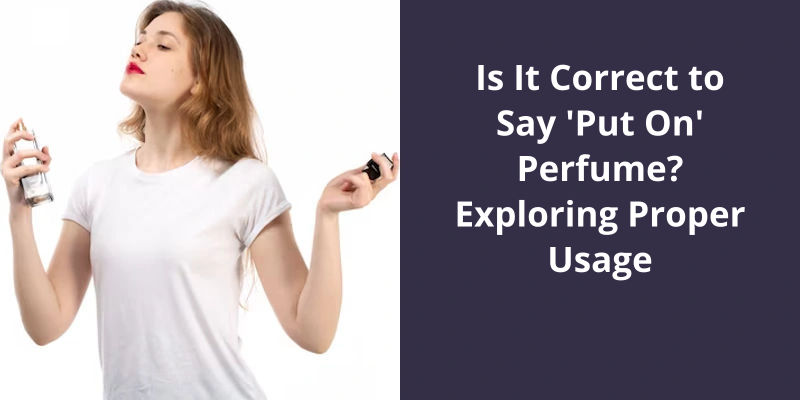Yes, men can wear cologne during Ramadan. This is because the use of fragrance, including cologne, is not considered to break the fast during Ramadan. According to Islamic traditions, only eating, drinking, and certain other actions directly linked to consumption break the fast. Therefore, as long as the cologne is only applied topically to the skin and not ingested in any way, wearing it would be permissible. So, Muslim men can continue their routine of wearing cologne during the holy month of Ramadan without violating their fast.

Is Cologne Allowed During Ramadan?
However, there are some limitations to this allowance. The use of perfume shouldn’t be excessive or offending to others around. The purpose of Ramadan is to purify oneself spiritually, mentally, and physically, and wearing too much fragrance can distract from that goal. Additionally, it’s important to remember that the use of perfume isn’t the primary focus of the holy month of Ramadan, and one shouldn’t prioritize it over deeds and actions that will bring them closer to God.
It’s customary in many Islamic countries to take a shower after breaking the fast and applying perfume before attending evening prayers. This tradition symbolizes a state of being refreshed and purified, both physically and spiritually. Wearing perfume can also help to keep ones spirits high and enhance the feeling of joy and celebration that’s commonly associated with breaking the fast and sharing meals with loved ones.
It’s a common question whether men are allowed to wear cologne in Islam or not. According to various hadith interpretations, wearing perfume is highly recommended for men, especially when attending the mosques or any religious gatherings. It isn’t only considered a sign of cleanliness but also a way to please Allah and attract the angels around us. In this article, we will explore the relevance and importance of fragrance in Islamic culture and answer some frequently asked questions related to it.
Are Men Allowed to Wear Cologne in Islam?
Islam has always been a religion that values cleanliness and personal hygiene. In fact, it’s one of the pillars of the faith, with Muslims being encouraged to maintain their personal hygiene by taking regular baths, brushing their teeth and wearing clean clothes. As part of this emphasis on cleanliness, wearing cologne or perfume isn’t only permissible but is also recommended.
For men, there are various hadith interpretations that require them to wear perfume, especially when attending the mosques. The Prophet Muhammad himself was said to have been a lover of perfumes and used to wear them on a regular basis, which may explain why it’s encouraged for men to do so too.
Rather, it should be done in moderation and only as a means of personal hygiene and enhancing ones personal fragrance.
Additionally, it’s important to consider the ingredients used in the cologne or perfume and ensure that they’re halal. For example, some perfumes may contain ingredients derived from alcohol, which is haram (forbidden) in Islam. In such cases, it’s recommended to avoid using such products and instead opt for those made with halal ingredients.
The Significance of Personal Hygiene in Islam
Personal hygiene is an important aspect of Islam as it promotes good physical and spiritual health. Muslims are encouraged to practice cleanliness and upkeep of their bodies, particularly before prayer and other religious activities. This includes washing hands, face, and feet regularly, cutting nails and hair, and observing proper menstrual hygiene. Maintaining personal hygiene reflects a sense of responsibility towards oneself and the community, and is seen as a means of showing gratitude towards God.
While pure perfume oils and attars are deemed halal, the use of alcohol in designer and niche perfumes may conflict with Islamic principles. This issue has sparked discussions within the Muslim community on what constitutes a halal perfume.
What Type of Perfume Is Halal?
For many Muslims, the use of alcohol-based perfumes is a common concern as they’re typically viewed as non-halal. This is due to the fact that Islamic dietary laws consider the consumption of alcohol to be prohibited. In the same way, Muslims avoid using perfumes containing alcohol as they believe that the alcohol content is absorbed by the skin and subsequently enters the body.
As a result, many Muslim communities and scholars recommend the use of pure perfume oils or attars, which are derived from natural sources and don’t contain alcohol. Attars are created by steam distillation and are extracted from flowers, leaves, and bark. These oils are much stronger than traditional perfumes and they last longer too. They can also be blended with other oils to create personal, unique scents.
In contrast, modern-day designer and niche perfumes often utilize a combination of scented oils and alcohol carriers to achieve a desired aroma. These types of perfumes are problematic in terms of religious compliance and easily misunderstood by Muslims as being haram, or prohibited.
To address this issue, several perfumers and fragrance houses have been developing halal-certified perfumes that meet the specific religious requirements of Muslim consumers. These fragrances are carefully formulated to include natural ingredients and no alcohol. They’re certified by a halal certification agency that guarantees that all of the ingredients used are halal, which can give consumers peace of mind knowing that their fragrance is in compliance with Islamic dietary laws.
As more and more people look for halal-compliant products, it’s likely that the demand for these types of fragrances will continue to grow.
Cultural Significance of Perfumes in Islamic Traditions.
Perfumes hold a significant place in Islamic traditions, as they’re believed to be a means of cleanliness and self-care. The use of fragrances is encouraged in various aspects of life, including prayer, social gatherings, and special occasions. Many scents have also been associated with religious figures and are considered sacred. The cultural significance of perfumes in Islamic traditions reflects their value as a means of enhancing personal hygiene and spiritual connection.
Conclusion
However, it’s important for individuals to be considerate of those around them and to be aware of cultural and religious sensitivities when choosing how to present themselves during this important time of year. Regardless of personal preferences, it’s essential to approach this issue with respect, empathy, and an openness to different beliefs and perspectives.





